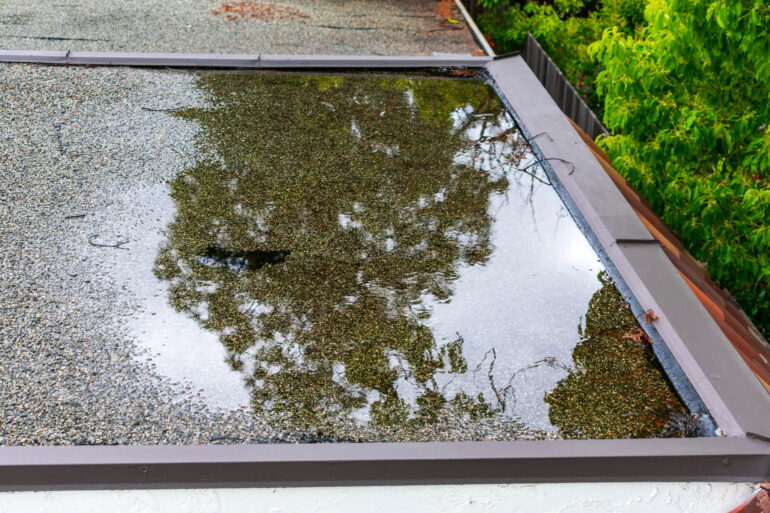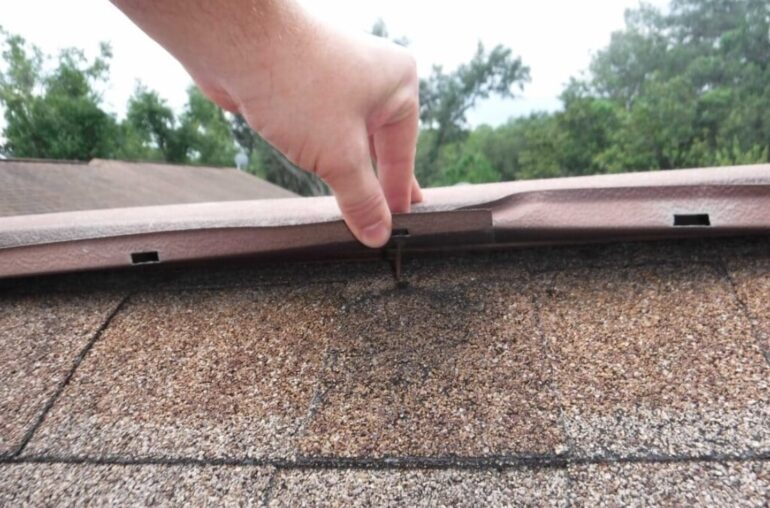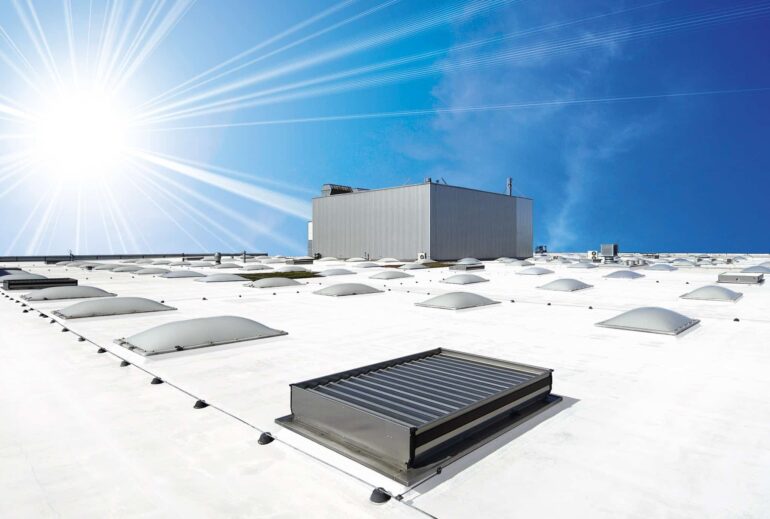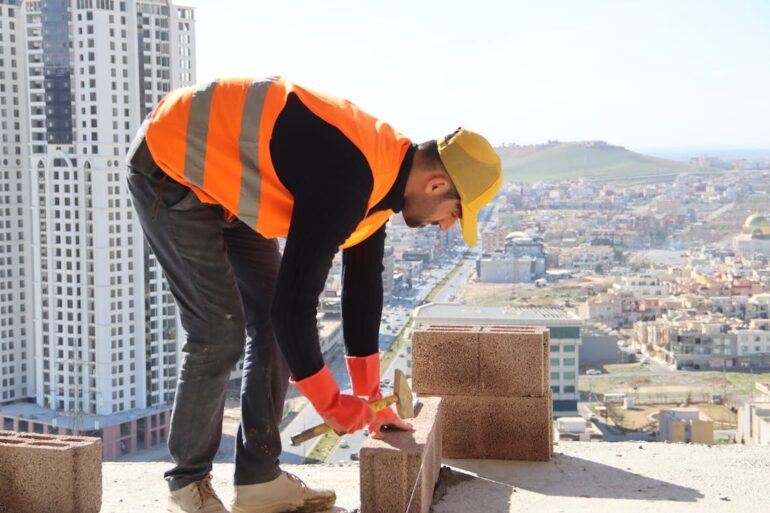Though frequently overlooked, the roof is the most important aspect of your industrial building. Not only does it protect the outside against the elements, but it also keeps the people and equipment safe inside.
Having your roof regularly inspected and maintained by industrial roofing contractors will help to delay the need for repairs and replacements. And with warmer, lighter and clearer days in the summer, there really is no time like the present!
Be sure to add the following to your summer maintenance checklist.
Look out for signs of leaks and pooling

When you look up at your industrial roof, if you spot discoloured circles somewhere on your roof or the walls inside your building, take this as your sign that water is ponding – usually as a result of a blocked drain, downspout or gutter.
Ignoring leaks and ponding can lead to electrical failure, equipment damage or, in some cases, roof collapse. So act quickly and arrange for an industrial roofing contractor to check it out and carry out the necessary repairs.
Clean the gutters
When was the last time you had your gutters cleaned? The chances are sticks, leaves, moss and other debris will have fallen into your guttering during the autumn and winter.
However, clogged gutters can be disastrous for your roof and the rest of your building – especially when it starts to rain.
If water can’t flow smoothly through the gutters, away from your building, it’s likely to pool up on your roof – leading to flooding and water damage. What’s more, if water gushes out of the gutters and overflows the ground, your foundations can weaken and become less stable.
Remove debris from the roof
It’s not uncommon for sticks, branches, leaves, rocks, and other unwanted debris to accumulate on the roof of your industrial building – especially in the autumn and winter.
As the seasons change, it’s worth inspecting your roof for debris and removing as much as you. This will help to reduce the risk of items potentially tearing or puncturing the membrane of your roofing system – eliminating the need for repairs and prolonging the lifespan of your roof.
Inspect the flashings

Flashing is a flat, thin piece of metal used to help waterproof the perimeter of roofing systems. It directs water away from the seams and joints – preventing it from entering the openings and cracks in your roof.
When it’s properly installed and maintained, it will lie flush with the roof membrane.
If it doesn’t lie flat with the roof, you’ll need to have it repaired as soon as possible to avoid structural damage to the roof or your building’s foundations.
Regular Inspections
Begin your summer roof maintenance routine with thorough inspections. Check for signs of damage, such as cracks, punctures, or loose roofing materials. Pay special attention to areas that are prone to damage, like seams, flashing, and roof penetrations. Identifying issues early can prevent them from escalating into costly repairs later on.
Inspect and Clean Gutters and Drains
Clogged gutters and drains can lead to water pooling on your roof, which can weaken the roofing materials and cause leaks. Clean gutters and drains to ensure proper water flow. Check for any damage or deterioration in these systems and repair or replace them as needed.
Proper drainage is essential for preventing water-related problems in the summer. Clogged gutters and drains can lead to water pooling on your roof, which can weaken the roofing materials and cause leaks.
Clean gutters and drains to ensure proper water flow. Check for any damage or deterioration in these systems and repair or replace them as needed. Proper drainage is essential for preventing water-related problems in the summer.
Seal Any Leaks Promptly
Summer storms can bring heavy rain and wind, potentially causing leaks in your roof. If you discover a leak, it’s essential to address it promptly. Delaying repairs can lead to more extensive damage, including mold growth and structural issues.
Identify the source of the leak and seal it with appropriate roofing materials or contact a professional for repairs.
Protect Against UV Radiation

The sun’s ultraviolet (UV) rays can cause roof materials to deteriorate over time. If your industrial roof isn’t already equipped with UV-resistant materials, consider applying a UV protective coating or membrane. This layer can shield your roof from the sun’s harmful effects and extend its lifespan.
Schedule Professional Inspections
While you can perform many maintenance tasks yourself, it’s advisable to schedule professional inspections at least annually, ideally before and after the summer season. Roofing professionals can assess the roof’s condition, identify potential issues, and recommend appropriate repairs or maintenance measures.
Plan for Roof Replacement
No matter how well you maintain your industrial roof, it will eventually reach the end of its lifespan. Be prepared to plan and budget for roof replacement when necessary. An aging roof that undergoes frequent repairs may be more cost-effective to replace with a newer, more energy-efficient system.
Roof Coating Inspection:
If your industrial roof has a reflective coating, check its condition regularly. Reflective coatings are designed to reduce heat absorption and improve energy efficiency. Ensure that the coating is intact and not peeling or deteriorating. If you notice any issues, consider reapplying the coating to maintain its effectiveness.
Contact industrial roofing contractors

If you have any questions about maintaining your industrial roof or you’d like to arrange a roof survey, don’t hesitate to contact reputable roofing contractors near you.
Choosing a local company will save you from having to wait to have your roof looked at professionally, as they’ll only be a stone’s throw away from your premises – taking less time to reach you.
Experienced industrial roofing contractors, such as Roofing Consultants Group, will be able to guide and advise you on how to extend the life of your roof and resolve issues before they escalate into something much more serious.
In conclusion, summer maintenance is crucial for preserving the integrity and longevity of your industrial roof. By regularly inspecting, cleaning, and addressing any issues promptly, you can protect your investment and maintain a comfortable and efficient working environment inside your facility.
Remember that a well-maintained roof not only extends its lifespan but also contributes to energy savings and minimizes downtime due to unexpected repairs.
